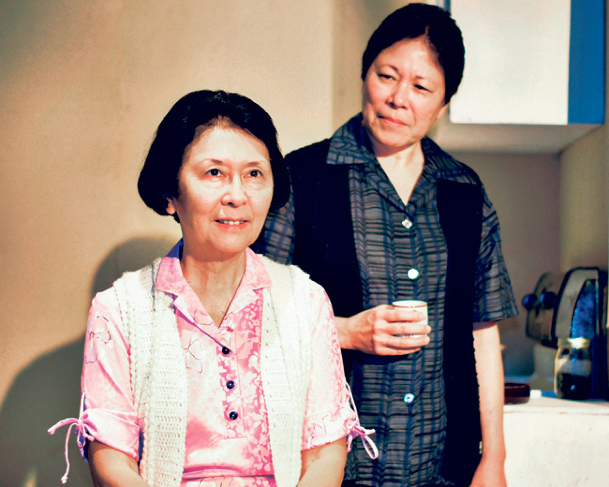Uprooted: Okinawan Migration
When the film Flight 93 came out, a critic begged the question: Why do we watch movies? Is it to entertain? Is it an escape? If so, then why would Flight 93, which reenacts in real time the story of the passengers that fought to take back the doomed 9/11 flight, be compelling when it does neither of those things? A Cage of Fireflies at Kumu Kahua Theatre afflicted me with the same deliberation. What is theater for?
art_1
There was no clapping or laughing. The dialogue was not witty or fast-paced. You don’t feel titillated or provoked. What would compel someone to sit through this ultra-realistic, contemplative study of three elderly Hawaii-born sisters of Okinawan ancestry? Fireflies doesn’t compromise. It forces the audience to settle into its quiet, deliberate setting.
Two kibei sisters – born in America, but who return to Okinawa for a time to stay with family for financial reasons – enter the living room of their simple Hawaii home and without even a good morning make some rice, cut up some fruit, sit at their sewing machines, and once in a while they share their dream of returning home to Okinawa. It’s clearly a routine they’ve been following for decades. Having never learned English, they confine themselves to their stifling abode where every so often their more adaptive sister, who oversees the inherited family orchid nursery and has a family of her own, whooshes in the door, trailing with her all the sunshine and gregariousness of a comfortable social life.
Despite my initial apprehension, once I accepted the play on writer Daniel Akiyama and director Phyllis Look’s terms, I came to appreciate this scholarly offering. Fireflies shines with an expertly enacted, tightly constructed script. Beautiful musical interludes are a plus. We grow to care about these sisters and become invested in their age-old struggle of tradition versus modernity, of ritual versus practicality, of generational, familial and social issues, of self-sacrifice. A person can either carry the essence of their culture with them and meld with their new surroundings, or suffocate like a trapped firefly. The recurring theme of textiles references the fabric of the sisters’ lives, which can either become as outdated as a 15th century kimono or it can be repur-posed into hip aloha wear. In the end, Fireflies is a surprisingly touching essay on the human condition.
For a more in-depth understanding of the issues touched on in the play, Akiyama, Look and UH professor Craig Howes, director of the Center for Biographical Research, will host a post-show talk story Feb. 1. Coincidentally, UH Manoa is offering a concurrent series of events relating to Okinawan history, including a lecture, symposium and exhibit. View the Feb. 7-22 schedule at hawaii.edu/asiaref/japan/event2013/Index.htm.
A word of warning: Plays at Kumu Kahua often sell out, so show up early or be confined to one of the five seats at the very back where you might as well be listening to a radio show.
the TICKET stub
A CAGE OF FIREFLIES
When: Thursday-Saturday at 8 p.m., Sunday at 2 p.m. through Feb. 24
Where: Kumu Kahua Theatre (46 Merchant St.)
Cost: $5-$20 More Info: 536-4222, kumukahua.org






